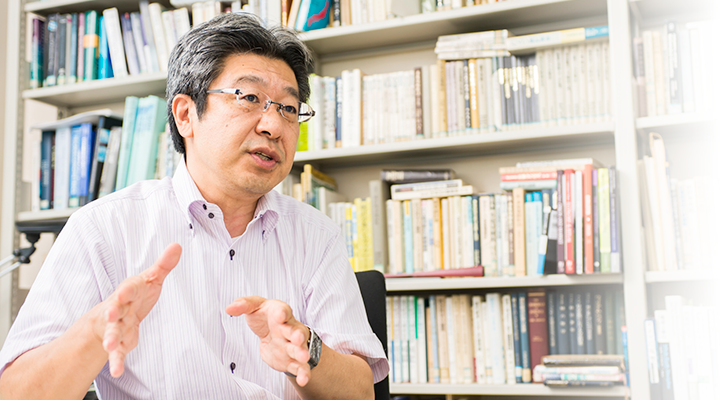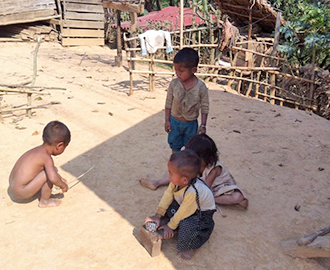
INTERVIEW
Comparing and considering the many factors
behind models of economic growth in Asian Countries.
Understanding the mechanisms
that cause poverty and
investigating policies that could
lead to economic development.
Social Implementation Course
Graduate School of Humanities and Social Sciences
Prof. Masaru Ichihashi
Comparing and considering the many factors
behind models of economic growth in Asian Countries.
Researching and analyzing the many factors affecting the mechanisms that control economic growth in different countries

Professor Ichihashi’s specialist subject is actually in the field of economics, ‘Comparative Study of Economic Development’.
For a long time he worked on quantitative analysis of Japan’s economic development, but after moving to the Graduate School for International Development and Cooperation (IDEC), he increased the scope of his research to include Asia. He has students from many Asian countries including China, Indonesia, Myanmar, Laos, Bangladesh, Sri Lanka etc., and they are working together to research the economic situations in those countries.

“Despite all being developing countries, they have different cultures and different systems. On the other hand they have some things in common like, banks, infrastructure, education etc. We are interested in and focus on the way that these various common factors and differences, affect economic development.” Professor Ichihashi says.
As a research style he wants to use a method which is common in economics, the ‘input-output analysis’, but the statistical data which this analysis is based on, is often not recorded by developing countries. Because of that, he sometimes takes a different approach and where available, uses a cross section of regional level data (provinces, regions etc.) and analyzes that via the system of ‘econometric analysis’.

“However, even these two methods are not enough. So, as a third option I often go and collect my own data in the field.” On these field trips he measures things like income levels, source of income and family structures.
“At the moment, along with a student of mine, a doctoral candidate from Laos, I am conducting a rural survey of Laos. This is one of my research themes, but what I really want to know is ‘What kind of mechanisms cause poverty?’”
Alongside teaching at university, I’m pushing forward with field surveys alongside my Taoyaka students


The previously mentioned student from Laos is a Taoyaka Program student, and Professor Ichihashi had this to say about his impression of the progress so far.
“He was a government official in Laos and was interested in how to help improve Laos’ economic development, so he came to study under me. At the start he wanted to study how open policies had impacted the Laotian economy, but the data he needed to base his research on was impossible to find, so there was no way to do it. So, he went back to his original interest of the problem of poverty creation and started thinking. His passion to try and help his home country was great and he put this into his work.”

We are still working on the rural survey of Laos now, but have run into some unexpected difficulties. This kind of method is recently becoming mainstream in the world of economics, but the actual fieldwork is still a work in progress.
“The main subject is rural villages engaged in agriculture, but when we went there we found that there were wealthy and poor households. The key word to describe why this disparity occurs is finance. Our prediction was that the poorer households would be borrowing from the richer ones, which would lead to this cumulative income gap. I wanted to support this supposition with data analysis and that is what we are working on now.”
This kind of activity, visiting troubled areas and thinking about economic development while there, also links back to the aim of the Taoyaka Program. The professor is also in charge of the Taoyaka Program’s ‘comparative study of economic development’. This course is a series of lectures on the basic theories related to economic development, outlining the basic concepts of macro-economics and econometric methods using empirical models of international economic data.
We hope to attract students with the desire to ‘try new things’

Professor Ichihashi himself firmly believes in the Taoyaka Program.
“The main purpose of this program is, within an interdisciplinary framework, to think about how to help relieve these difficult to develop areas. It really makes me wish that I had started this kind of thing sooner. It’s necessary to fulfill both this mixed technological and cultural approach, and the approach of letting students deepen knowledge of their special fields, so in a way it is a very demanding program.
Thus, I expect students who are aware of that, students who have high levels of awareness to take part. For my part, I want to help to support them in any way I can.”
He also had this advice from the point of view of his own special area of study.
“Economic problems can’t be solved by simply becoming an expert in one particular part of the problem. If you don’t carry out analysis based on a great number of considered factors, it will be unbalanced. The Taoyaka Program is not just about extending your specialist knowledge. It’s an ambitious endeavor and you have to think of how to push economic development while considering a number of factors such as technology and culture. I fully expect to see a lot of students on the course who think outside the box and exceed conventional limits. At the same time, I hope it will be useful for me to extend my own economic research.”
![]()
Masaru Ichihashi Professor
International Economic Development Program, Division of Humanities and Social Sciences, Graduate School of Humanities and Social Sciences
April 1, 2020 – Professor, Graduate School for International Development and Cooperation, Hiroshima University
October 1, 2010 – March 31, 2020 Professor, Graduate School for International Development and Cooperation, Hiroshima University
April 1, 1999 – September 30, 2010 Research Associate, Department of General Science, Hiroshima University
January 1, 1996 – March 31, 1999 Part-time Lecturer, Faculty of Commercial Sciences, Hiroshima Shudo University
January 1, 1994 – March 31, 1997 Lecturer, Department of General Science, Hiroshima University
January 1, 1992 – March 31, 1994 Lecturer, Faculty of Humanities, Kochi University
January 1, 1990 – March 31, 1992 Research Associate, Faculty of Humanities, Kochi University





